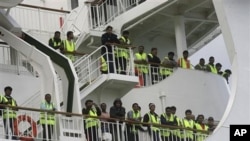The United Nations is appealing for $160 million to meet the emergency needs of an estimated 460,000 people who have fled Libya's violence or remain trapped inside the country. U.N. officials say they will revise the appeal and action plan in two weeks to reflect the changing situation.
Libya has been host to about 2.5 million migrant workers. More than 200,000 of them have fled since mid-February, mostly to Tunisia, Egypt and Niger. But many more are stranded in Libya and need help, according to the director-general of the International Organization for Migration, William Swing.
"Many more want to come out," said Swing. "It is not entirely clear why the large flow of about 1,000 per hour only a week ago, has now ebbed to only a couple of thousand a day over this past weekend. So, we know at some point that there are many, many more people who need help and a lot of these are very vulnerable."
The U.N. High Commissioner for Refugees, Antonio Guterres, says he is very concerned about the community of sub-Saharan Africans. He says hundreds of thousands of Africans are in Libya, but very few have shown up at the border.
"We believe that many of them are just afraid to move," said Guterres. "The fact that for the population in general, there is sometimes a confusion between all these innocent people and a bunch of mercenaries that were supporting the government. It has created an environment of terror in which these people are really feeling afraid to move."
Libya has agreed to allow a U.N. mission to go into the capital Tripoli to assess the humanitarian situation. U.N. Emergency Relief Coordinator Valerie Amos says the United Nations will press for unhindered access to all parts of the country.
"We are particularly concerned about the lack of access we have to the west of Libya," said Amos. "We have had an assessment team go into the east and into Benghazi to see what the needs there are, and we are getting reports of people who are injured and who have died and they have not been able to receive help”"
Funds received through the $160 million appeal will be split among 17 U.N. and private aid agencies. The appeal is for projected needs of the next three months and covers camp management, food security, nutrition, health care, water, sanitation, protection, shelter and logistics.
UN Seeks $160 Million for Migrants Caught up in Libya's Violence
- By Lisa Schlein




